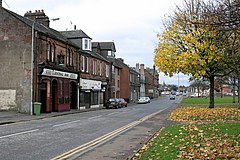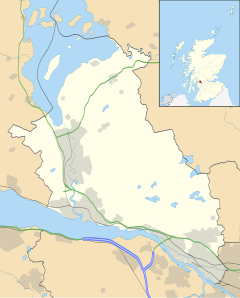Renton, Dunbartonshire
Renton
|
|
|---|---|
 Main Street in Renton |
|
| Renton shown within West Dunbartonshire | |
| Population | 2,138 |
| OS grid reference | NS3878 |
| Civil parish | |
| Council area | |
| Lieutenancy area | |
| Country | Scotland |
| Sovereign state | United Kingdom |
| Post town | DUMBARTON |
| Postcode district | G82 |
| Dialling code | 01389 |
| Police | Scottish |
| Fire | Scottish |
| Ambulance | Scottish |
| EU Parliament | Scotland |
| UK Parliament | |
| Scottish Parliament | |
Renton (Scottish Gaelic: An Reantan; Scots: The Renton) is a village in West Dunbartonshire, in the west Central Lowlands of Scotland. In the 2001 National Census it had a population of 2,138.
Renton is particularly famous for the village's association football side. Renton was one of the 11 founder members of the Scottish Football League and winners of the 1885 and 1888 Scottish Cup, producing many famous players.
The Renton takes its name from Cecilia Renton (daughter-in-law of Tobias Smollett) after whom the modern sandstone, 'model' village was named in 1762. Dalquhurn Bleachworks in 1715 and Cordale Printworks in 1770 were responsible for attracting new industrial workers. At the north of the village stood the Place of Bonhill, a residence from 1642, to the South was Dalquhurn House. Two parallel north-south streets, Main Street and Back Street were first joined by Station Street, Stirling Street, Burns Street, Thimble Street, Market Street and Red Row. In late Victorian times, the village extended southwards to Leven Street, Alexander Street and John Street. Further expansion occurred in the 1930s as housing was built in the grounds of Cordale House. In the early 1960s the majority of the sandstone properties in the village were compulsory purchased by Dumbarton County Council, demolished and replaced by Dumbarton County Council with 1960s Brutalist-style concrete houses and flats; the majority of which have been replaced by proper houses, own front & back door, by the Cordale Housing Association.
It has traditionally been a stronghold of radical left-wing politics; during the 1930s it had Communist councillors, Buster Lamont, never toed the Labour Party line and independent councillors such as Jimmy McKenzie (1960/70s), and since 1999 it has been represented on West Dunbartonshire council by Jim Bollan, at present the Scottish Socialist Party's only councillor.
...
Wikipedia

